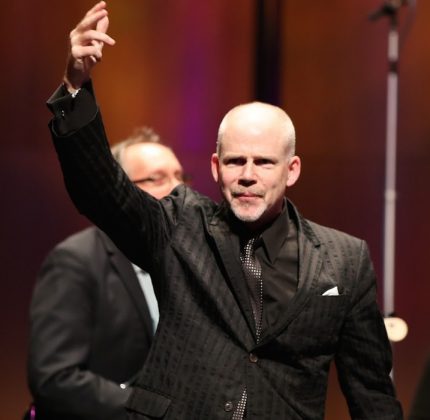Ear Taxi hits the street with compelling music by Malmquist and Ogonek

Ear Taxi Festival is out of the garage and on the street.
The big, much-anticipated festival opened Wednesday night at the Harris Theater, kicking off five days of new music. Co-curated by Augusta Read Thomas and Stephen Burns, the dizzying lineup will present a wide array of works by 88 composers, including 65 premieres, performed by over 350 musicians through Monday night.
An early session with jazz pianist-composer Patricia Barber and soprano Whitney Morrison opened the festival at the Harris Theater, followed by a panel discussion in the first-floor lobby.
Co-curator Burns led off the evening program with his Fulcrum Point New Music Project performing three works for mixed chamber orchestra of strings, winds and percussion.
First up was Alex Mincek’s Pendulum II: Yap, Yaw, Yawp, the second in the composer’s series inspired by “the physical, temporal and spatial phenomena” demonstrated by the swinging motion of the pendulum. Befitting its title, Yap, Yaw, Yawp certainly succeeded in kicking things off with gnarly, grinding energy and driving dynamism, muted brass supplying the necessary yawps. Yet the alternating percussion bursts, breathy bass flute accents, and oscillating string figures don’t quite sustain interest over the work’s twenty-minute length.
More compelling was Mischa Zupko’s Fahrenheit. This mini-piano concerto was inspired by the idea of flame as rebellion, tracing the arc of Ray Bradbury’s Orwellian novel Fahrenheit 451 in a tripartite single movement. If the scoring was a bit raucous at times, Fahrenheit had the benefit of Winston Choi as piano soloist. He brought assured dexterity to the opening section, conveyed the cool pointillist expression of the slow central music, and brought polished virtuosity to the frenetic final section. Burns kept the rapid-fire alternation of soloist and orchestra admirably on track.
The clear highlight of this set was Elizabeth Ogonek’s Ringing the Quiet, heard in its U.S. premiere. The CSO composer-in-residence’s music has a distinctive voice and poised expressiveness that stand out from new-music cliches. Inspired by a poem by Laura Kasischke, Ogonek creates a compelling journey in just eight minutes. The music moves from unsettling brass rumbling to swelling string passages and a luminous solace with raindrop-like sounds from harp and piano and a consolatory viola solo. Burns and the Fulcrum Point musicians provided alert and sensitive advocacy.
Chicago’s two leading youth orchestras were both heard on the evening’s second half.
The Chicago Youth Symphony Orchestras performed two works. Even on the ample Harris stage, the teen players were so densely packed it was a miracle they had room to play their instruments. Conductor Allen Tinkham had to squeeze his way through their ranks to get to the podium.
Composer Jonathan Newman says his Blow it Up, Start Again (2011) was inspired by Guy Fawkes and the idea that if the system isn’t working one should follow Fawkes’ lead and “go anarchist.” That sentiment is certainly timely in an era of widespread political disaffection, yet Newman’s piece is considerably less revolutionary than his note suggests. Blow it Up seems like a rowdy band encore piece, scored here for huge forces, and entertaining in its low-brass rhythms and high-stepping jazz and funk riffs, even with passing cribs from West Side Story and the theme from Peter Gunn. The ensemble was not entirely clean–how could it be with almost 120 musicians?–but Tinkham led his young CYSO charges in a mostly polished and enthusiastic performance.
Eric Malmquist’s Prairie Music was the sole world premiere of the evening, and the clear highlight. Also scored for large orchestra, the music is built on a rising figure for strings, set against low brass phrases, that segues into a more ardent and yearning expression with each repetition. As reflected in the title, there is something of the open prairie sound of Copland in Malmquist’s Midwest style, albeit glimpsed through a more stoic modern sensibility. Tinkham and the Chicago Youth Symphony Orchestras gave this premiere a full-boded and eloquent debut and the composer was warmly applauded by the audience.
It was the Civic Orchestra’s turn to close the evening with music of Mason Bates, former CSO composer in residence. Inspired by a helicopter flight over the Arizona landscape, Desert Transport opens with a high-flying theme for strings over a motoric, pulsing accompaniment. The music threatens to tip over into John Williams territory at times in its cinematic slickness, and the sampling recording of Pima Indians in the middle section feels like added-on gimmickry. Still Desert Transport is an effective and communicative piece, cast in Bates’ most attractive vein of big-boned Americana.
Erina Yashima led the young adults of the Civic Orchestra in a well-played if fitfully cautious performance with notably nimble and luminous playing by the Civic violins.
Ear Taxi Festival continues through Monday. eartaxifestival.com
Posted in Performances


